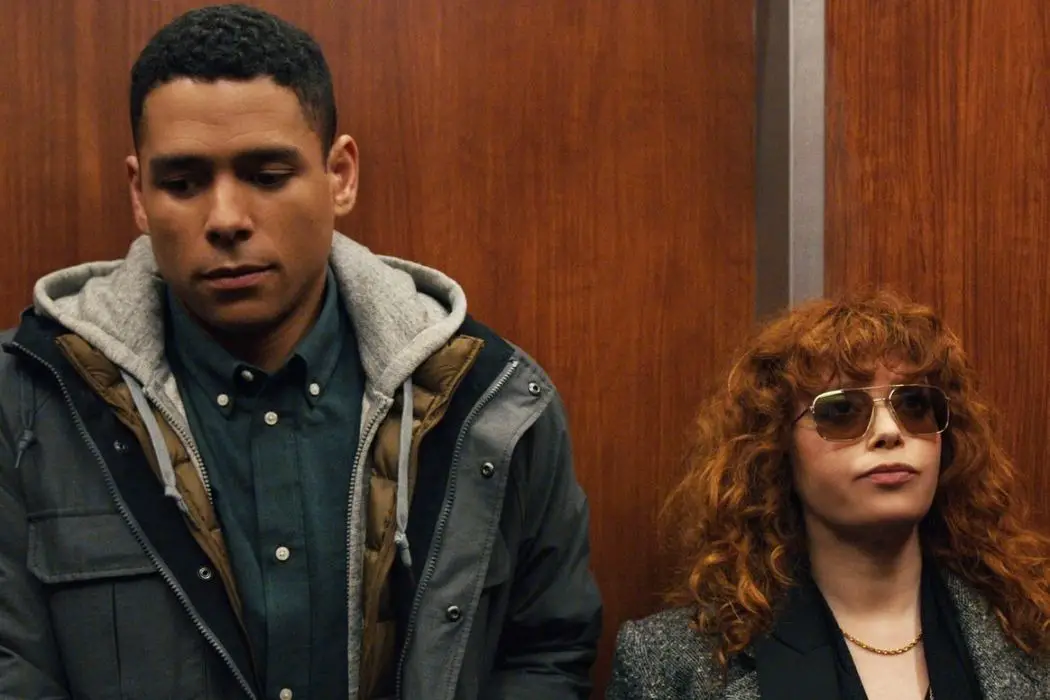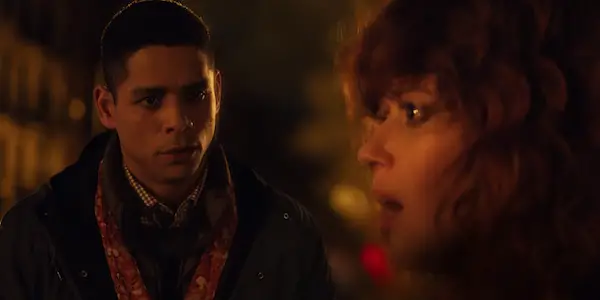Hopeful Existentialism: RUSSIAN DOLL and THE GOOD PLACE

Frances is a graduate of film and digital media from…
Since the shift from cable TV to streaming services, we’ve seen an explosion of complex television shows that require the type of chronological viewing unique to our era. Serial TV shows thrive over their more formulaic, episodic counterparts, and they proliferate over myriad streaming services.
With this saturation of affordable on-demand content, TV shows have been pushing boundaries in hope of originality. Some highly celebrated shows tackle dour themes like depression and existential despair in this pursuit, like BoJack Horseman and Rick and Morty. Others engage with gritty violence and cynicism, like Game of Thrones or Breaking Bad. These tend to favor morally gray, dark, or unhappy characters and arcs, refusing definitive positivity.
A few brave shows have attempted perhaps a more difficult task. They center the existential despair of deeply flawed and often unhappy humans, yet maintain the conviction of human goodness. These hopeful series, the progeny of both technical and social trends, demonstrate human change and redemption against all odds.
Two of these series, The Good Place and Russian Doll, are wildly different in tone but reminiscent of each other on a philosophical level. They explore the ideas of choice and free will, ethics, and redemptive change. Though one is a goofy, fantastical sitcom set in the afterlife, and the other is a darker, dry comedy-drama, they each rely on deep relationships improving their characters as they navigate unearthly obstacles. Spoilers ahead; this is best read with prior knowledge.
The Rules
The Good Place and Russian Doll feature cyclical experiences of terrible experiences. In The Good Place, Eleanor and several others are trapped in hell, and every time they realize that this odd heaven is actually torture, their memories are wiped and they start over from the beginning. Russian Doll features Nadia dying over, and over, and over, as the universe seemingly conspires to send her back to one night. She remembers every death, though, as her punishment is more a universe-inflicted glitch than anything else.

Our heroes run into questions of free will on their odd journeys. Eleanor and her friends discover what life could have been like with a little push in one direction or another, as their lives change more drastically with every interaction. Nadia, on the other hand, is forced to confront her and Alan’s connectedness as they meet and discover they die at the same time in every time loop.
The philosophy underpinning both TV series is readily apparent in each. Nadia and Alan muse over what created the time loop, considering whether they are inherently “good” or “bad,” and whether the universe is punishing them or testing them. Eleanor, meanwhile, learns philosophy from Chidi as she tries to be a better person — Nadia and Alan’s hypothesis, their reality — to avoid punishment.
Human Kindness
These shows both follow their protagonists from selfish, isolated existences into eventually realizing that their lives influence others. Incidentally, each protagonist’s strongest relationship is with a neurotic, good-hearted counterpart — Alan in Russian Doll and Chidi in The Good Place.

These characters feature as foils to the primary protagonists, whose goal is to leave the loop at any cost. Alan and Chidi are reluctant to let go of the situation, which, for them, is identity-affirming. Alan clings to the total control he has over the one day he gets to live over and over again. Chidi relies on the fake Good Place to confirm that he is and has always been a good person — Eleanor, in her desire to tear down the illusion, is his torture.
The characters in these shows have to grapple with flaws not only in themselves but in others. When they seek revenge for those who have harmed them, or for the system that put them in this place, they fail. They only succeed when they overcome their weaknesses and do good, surrendering the control of others.
Eleanor and Nadia have to grapple with their unhappy childhoods and guarded adulthoods to find their way out of these time loops. They begin to trust their friends, pushing past their selfish habits to improve themselves and help others do the same. And this dynamic is not a fluke, but a constant. In The Good Place, the humans’ situations change wildly between loops, but despite their missing memories, they always manage to find — and help — each other.
Change
In Russian Doll and The Good Place, we learn that, above all, people change, and people change because of other people. This oddly optimistic view of human interaction shows us not only moral improvement but true happiness achieved by characters who work together — not because they intended it, but because they want to be better for each other.

This change can come at any time, according to these series. It’s never too late to redeem yourself, literally — almost comically so in The Good Place. And it’s not just people. In these shows, everything changes.
Instead of an episodic compulsion for characters and settings to remain the same, or drawn-out arcs of one mystery per season, the characters in Russian Doll and The Good Place are allowed to discover. It is the strength of the writers that allows character agency not to threaten the plot, but to invite more complexity. Permitted to create seasons and episodes of varying length, each show boasts smart, concise installments with little filler.
Accordingly, and shockingly when compared to most other series, these shows have drastic season one finales. The Good Place changed formidably from season to season as it experimented with new arcs, and presumably, Russian Doll will have to do the same in its season two.
Amidst hordes of well-written, depressing TV series, it is a welcome intrusion to experience two shows that ground themselves in the fundamental truth of human connection. And given their success, it may be just the beginning for this hopeful, kind philosophy.
Have you seen any other shows like this? Where do you think Russian Doll will go next?
Russian Doll season 2 has been officially confirmed by Netflix.
Watch Russian Doll
Does content like this matter to you?
Become a Member and support film journalism. Unlock access to all of Film Inquiry`s great articles. Join a community of like-minded readers who are passionate about cinema - get access to our private members Network, give back to independent filmmakers, and more.
Frances is a graduate of film and digital media from California. She enjoys watching and expounding theories on cinema, especially when experimental or directed by women. In her spare time she enjoys reading short stories and writing queer fantasy.













